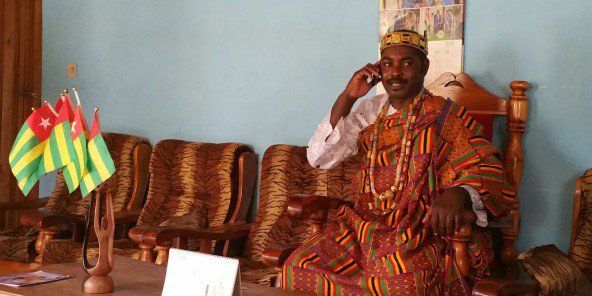Announced on March 11 in the Council of Ministers, the “e-village” project aims to offer cell phones to the heads of cantons and villages in Togo. A project well received by the public even if it arouses a certain mistrust in the ranks of the opposition.
Make a mobile phone, a SIM card and a monthly communication credit available to more than 4,000 heads of cantons and villages in Togo. The “e-village” project presented on March 11, 2016 in the Council of Ministers, should make it possible “to secure the territory, prevent and manage risks”, and serve as a survey tool available to the national institute of statistics and economic and demographic studies (INSEED).
A village chief will thus be able to give information on the life of his locality, the number of births, deaths, marriages, the price of foodstuffs on the market, the number of foreign visitors… Elements which will make it possible to follow more easily the social evolution of Togo far from the big urban centers. Ultimately, a voicemail must be developed to facilitate the reporting of information.
The telephones given to the village chiefs must also allow them to quickly reach the upper administrative level in the event of disasters or emergencies. Until now, this contact had been disparately established on the territory, according to the means at hand. A situation which sometimes creates tragedies: fires that are not brought under control in time, difficult deliveries and illnesses to be treated in an emergency, as in the meningitis epidemic which is currently hitting the north of the country.
The other major challenge to which this project responds, the implementation of which must begin in April, is to secure the territory
The other major challenge to which this project, whose implementation is due to start in April, is responding, is to “secure the territory”, in an international context marked by terrorist attacks in Burkina Faso, Mali and more recently in Ivory Coast. Telephones must allow notables to report suspicious cases, particularly in localities close to the country’s land borders.
Deploy the mobile network
“The project is an initiative to be welcomed as it saves lives, offers thousands of children a birth certificate and improves the provision of services to citizens,” said Gerry Taama, president of Le Nouvel. commitment of the Togolese (NET), unsuccessful candidate for the presidential election of April 2015. “We must now deploy the mobile telephone network throughout the territory and offer, for example, battery recharging systems by solar energy to the populations”, continues Gerry Taama, also founder of the African Defense and Security Observatory.
Some opponents suspect the power to prepare the ground for the upcoming local elections. For Professor Aimé Gogué, opposition MP and unsuccessful candidate for the last presidential election, the project is good in its essence, especially on its security aspect, “but it can be a means for the power to monitor even more the activities of opposition on the ground in view of the upcoming elections. ”
Preliminary survey
For the Minister of Posts and Digital Economy who co-manages the file with her colleague from the Territorial Administration, “a first survey will be carried out to determine the networks available in the localities”. According to Cina Lawson, this will make it possible to offer different SIM cards (Togocel or Moov) depending on the signal strength available. “The GPS coordinates of the localities where the networks are absent will be noted to allow, within the framework of the universal service of telecommunications, to deploy the network very quickly”, she explains. Currently, the two operators claim to cover at least 70% of the territory, with a mobile penetration rate of 93%.
The cost of the project is estimated at just over 150,000 euros for the first year
Togbui Victor Hola Kpodo Dra IV, head of the Togblékopé canton (25 km north of Lomé) welcomes the initiative and considers that “e-village” corresponds to an essential need of its counterparts, especially in remote areas. “There are many dramatic situations that these phones with communication credits can avoid.” However, he would like a real follow-up to be put in place because “certain chefs must learn to use the phones and above all understand exactly what is asked of them to report as information. ”
The cost of the project is estimated at just over 150,000 euros for the first year. The sum must be used to buy the terminals, pay the communication credits and carry out the work of identifying the beneficiaries. From the second year, the cost must be reduced to 50,000 euros.
Source: jeune afrique


Leave a Reply